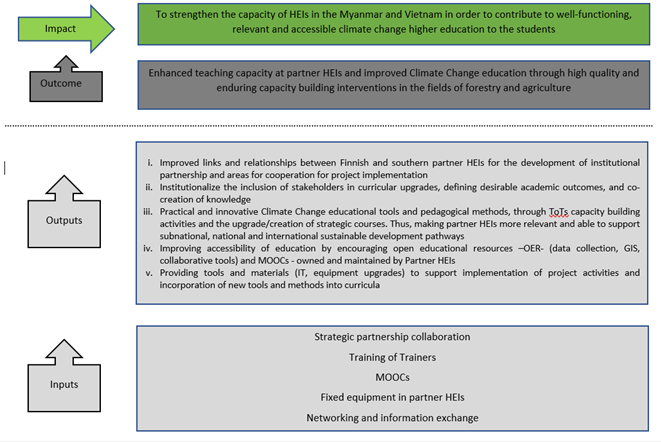Vietnam was severely affected by climate change in the last two decades, with agriculture and forestry sectors being particularly vulnerable. In compliance with Article 6 of the UN’s Framework Convention on Climate Change (UNFCCC), Vietnam is working towards enhancing climate change education and public awareness through training and other means. Education helps to instil values, attitudes, and behaviours not only in the general public but also in the future leaders of society. Therefore, a continuous flow of graduates with improved knowledge and skills will lead to an increased understanding of climate change to support fact-based decision-making resulting in increased resilience of vulnerable communities. In the preparation of the CLIDEV project, the consortium has developed a formal theory of change to track the pathways to desired change.

The theory of change will be complemented by the Learning by Developing model (LbD) in the strengthening of Climate Challenge education in Vietnam. The LbD model is implemented in three phases, in the so-called Open Innovation Camp process that was develped by Laurea

The CLIDEV project impact statement is “to strengthen the capacity of HEIs in Vietnam in order to contribute to well-functioning, relevant and accessible climate change higher education to the students”. In order to achieve this, climate change curricula at the partner HEIs should be structurally strengthened and existing cooperation structures between the participating universities and institutions – and relevant stakeholders – should be stabilised. In order to contribute to the impact, the CLIDEV project defined the following outpus and indicators:
OUTPUTS | INDICATORS |
Improved links and relationships between Finnish and southern partner HEIs for the development of institutional partnership and areas for cooperation for project implementation | - Efficient management and communication in operation; - Four planning documents completed during the assessment phase (NAR-materials, NAR-curricular, Annual Working Plans, Implementation schedule for activities) |
Institutionalize the inclusion of stakeholders in curricular upgrades, defining desirable academic outcomes, and co-creation of knowledge | - Number of participants in the participatory workshop and the level of participation by different sectors - Response rate for interviews and surveys implemented by partner HEIs |
Practical and innovative Climate Change educational tools and pedagogical methods, through ToTs capacity building activities and the upgrade/creation of strategic courses. Thus, making partner HEIs more relevant and able to support subnational, national and international sustainable development pathways | - No. of intensive ToTs, no. of courses upgraded, and no. of new courses implemented in partner HEIs - Upgrade content for selected courses and new courses enter the accreditation process |
Improving accessibility of education by encouraging open educational resources –OER- (data collection, GIS, collaborative tools) and MOOCs - owned and maintained by Partner HEIs | - Courses upgraded in the revised curricula based on the new knowledge on multidisciplinary approaches - Functioning OER and MOOCs at partner HEIs |
Providing tools and materials (IT, equipment upgrades) to support implementation of project activities and incorporation of new tools and methods into curricula | - Needs-based assessment report prepared by partner HEIs; - Computer and other materials will be delivered and well-functioning |
